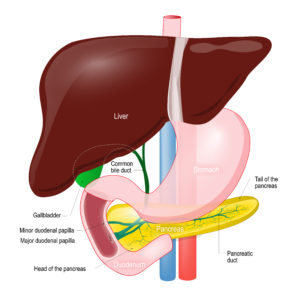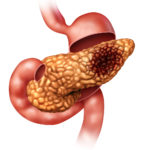 Pancreatitis is a potentially serious condition that affects the pancreas which is an organ that is in the stomach and it becomes tender, swollen and inflamed. The pancreas is an important organ as it produces and releases vital enzymes used in the digestion of food in the stomach. It also releases other hormones such as insulin.
Pancreatitis is a potentially serious condition that affects the pancreas which is an organ that is in the stomach and it becomes tender, swollen and inflamed. The pancreas is an important organ as it produces and releases vital enzymes used in the digestion of food in the stomach. It also releases other hormones such as insulin.
With pancreatitis, these enzymes leak and cause the tissue they encounter to be digested which causes considerable pain and therefore it is vital if you think pancreatitis is the problem, you need to take them to the vet as soon as possible.
Pancreatitis is more common in middle to older aged dogs as well as in certain breeds like Terriers, Spaniels and Miniature Schnauzers.
A common cause is too many lipids in their blood which are fats from their diet. It is common with dogs who have a poor diet or those that eat out of rubbish bins where their diet is high in fat contents. It is also caused by other medical conditions like thyroid problems and them being on certain medications.
There are two types of pancreatitis, acute and chronic. Acute pancreatitis comes on suddenly and causes severe pain and chronic pancreatitis progresses over time and more continuous.
There are a few signs you can look out for if you suspect pancreatitis:
- Diarrhoea
- Loss of appetite
- Vomiting
- Weakness
- A high temperature
- Crying or whimpering
- Hunched position where they hold their chest down and rear raised
- Collapse
- Depression or anxious
- Pain to the touch around their stomach
If you suspect pancreatitis, take them to the vet as soon as possible. Your vet will be able to give painkillers, anti-vomiting drugs and advise on the best treatment which could be in mild cases, to restrict food for up to 48 hours to keeping them in to monitor them and give intravenous fluids to maintain the hydration levels while they are not eating.
The vet will often carry out blood tests to look at the levels of an enzyme in the blood. They may also carry out ultrasound, X-rays or sometimes a biopsy to look closer at the problem and how bad it is.
The vital time is the first 48 hours so prompt vet action can prevent too much organ damage and resolve the problem. Your vet will advise on future feeding management to avoid the problem returning.


Pingback: Dog Digestive Process and what the stages are and how it works
Pingback: Vomiting causes and types in animals could be caused by a number
Pingback: Diarrhoea in animals - Pet First Aid Wiki